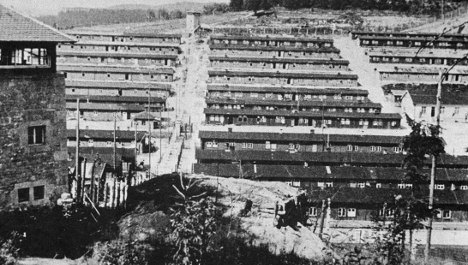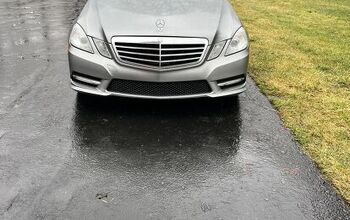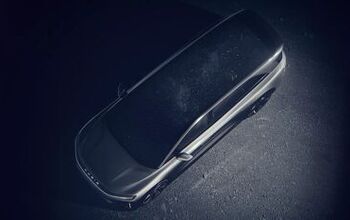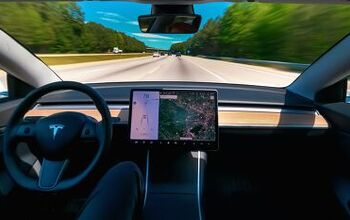Audi "Shocked" by Study on Slave Labor During Nazi Era That Finds Auto Union 'Morally Responsible' for 4,500 Deaths

Flossenburg concentration camp, where slave laborers for Auto Union were imprisoned and executed.
A historical study commissioned by Audi to examine its corporate predecessors’ ties to the Nazi regime has revealed that Auto Union had exploited at least 20,000 slave laborers and held “moral responsibility” for the deaths of about 4,500 inmates of the Flossenbürg concentration camp who worked at a sub-camp operated for Audi in Leitmeritz, Bavaria. They died and were murdered while slaving for the German automaker. Audi expressed “shock” at the news and said that it is going to be revising company publicity materials about one of its founders, Dr. Richard Bruhn, who was revealed by the study to have close ties to the Nazi leadership. The company also said that it will consider compensating victims. Bruhn, considered the “Father of the Auto Union” was found to have exploited slave labor on a massive scale while serving the Nazi war effort.
Audi told Siegel that it would be changing online profiles of Bruhn at the company’s German website and today the company told Germany’s The Local that it has contacted its operations in other countries asking them to revise their materials on Bruhn, which describe him as having “guided the company with great competence” before the war and securing a “high reputation” post-war which “made it possible to obtain the credit needed to re-establish the Auto Union”. Audi will also be revising displays at the Audi Forum’s “museum mobile” near the company’s headquarters in Ingolstadt and at the Horch museum in Zwickau. Not only is Audi making changes to reflect Bruhn’s less savory actions, Ingolstadt’s mayor, Christian Lösel, told journalists that the municipality was considering changing the names of streets like Bruhnstraße that currently honor the Auto Union founder.
Dr. Richard Bruhn, founder of the Auto Union company.
The study said that Bruhn maintained the “closest ties” to the highest ranking Nazis and that after 1942 he was personally responsible for Auto Union’s use of thousands of forced laborers. Bruhn had plans to expand the use of slaves but that was obviated by German reversals on the battlefield. He was a member of the National Socialist party and given the title of “ Wehrwirtschaftsfuehrer” (military industrial leader or, more formally, Leader of the Armament Economy). This quasi-military rank was given to the executives of companies that the regime considered important to arming Germany in the 1930s and later to the war effort. Günther Quandt, whose family today controls BMW, was given a similar honor by the Nazis.
Tank engines being assembled in an Auto Union factory, 1943.
The 500 page report, “Wartime Economy and Labour Deployment by Auto Union AG Chemnitz during World War II”, was authored by Martin Kukowski, who heads Audi’s own history department and Rudolf Boch, a University of Chemnitz historian, and published by Franz Steiner Verlag. The authors conclude that, “There can be no discussion about the closeness of Auto Union to [the Nazis].” Auto Union was “firmly ensnared in the National Socialist regime”. Bruhn was not the only Auto Union executive who was an enthusiastic Nazi. In early 1945, company managers were organizing plans to evacuate themselves to escape advancing Allied forces as they continued to use slave labor in their still operating factories.
Auto Union was created in Chemnitz, Germany in 1932 under the direction of Bruhn from the merger of four German automakers, Horch, Audi, DKW and Wanderer. Those four founding firms are symbolized by the four rings in Audi’s logo.
Auto Union was one of the companies that made the SdK FZ-11 half-track.
During the war Auto Union made military vehicles for the German war effort and was “ensnared to a scandalous degree in the complex of concentration camps,” according to Kukowski and Boch. At the end of the war, Bruhn was interned by the British occupation forces along with other German industrialists who helped the Nazis. Upon his release, in 1949 he started to get Auto Union going again. Bruhn, who died in 1964, revived the business group in Ingolstadt with funding provided by the United States’ Marshall Plan and started making DKWs. In the late 1950s, Daimler-Benz bought the company, eventually selling its shares to Volkswagen starting in the mid 1960s. After some corporate restructuring, in 1985 the Auto Union name was discontinued and VW renamed it Audi.
The authors determined that the Nazi SS built and operated seven forced labor camps specifically for Auto Union. Those camps enslaved over 3,700 prisoners, a quarter of them of Jewish descent.
Another 16,500 people were forced to work for Auto Union in the company’s factories in Zwickau and Chemnitz, in Saxony. Perhaps the strongest and most shocking charge against Auto Union and Bruhn is the authors’ claim that Auto Union management carried “moral responsibility” for the deaths of 4,500 inmates at the Flossenbürg concentration camp in Bavaria. They died while slaving for Auto Union at a forced labor camp in nearby Leitmeritz, the study said.
Conditions in the Zwickau concentration camp where many Auto Union workers were held, were “devastating” according to the historians. Prisoners lived in unheated barracks. The authors discovered that when workers at the Zwickau factory became disabled, they were shipped to the Flossenburg concentration camp where they were executed. Near the end of the war, nearly 700 Zwickau inmates were put on a forced march to Karlovy Vary in what is now the Czech Republic and barely half of them survived the death march.
Auto Union made the chassis and running gear for the SdK FZ-222 armored vehicle.
Audi expressed shock and concern over the findings and in addition to revising how the company portrays Bruhn it said that it would look into granting compensation to any former forced laborers who are still alive. Bruhn’s name also graces a number of company projects such as pension plans. Audi board member and head of the company’s workers’ works council Peter Mosch told Wirtschaftswoche, “I’m very shocked by the scale of the involvement of the former Auto Union leadership in the system of forced and slave labour. I was not aware of the extent [of this involvement].” Audi had previously acknowledged some role in the exploitation of forced labor during the Nazi era and has paid millions of dollars into a compensation fund managed by the German government.
Audi follows Daimler, BMW and its corporate parent Volkswagen in commissioning a historical study into ties to the Nazis during 1933-45.
An extensive, five-part, German language series on the study and Audi’s history with the Nazi regime, including interviews with survivors of the forced labor, can be found at Wirtschaftswoche. This TTAC post only touches on the material covered in Kukowski and Boch’s study. Even if you don’t read German, Google’s translator works well enough to give you the gist of the material in the Wirtschaftswoche series and I encourage you to check it out.
Ronnie Schreiber edits Cars In Depth, a realistic perspective on cars & car culture and the original 3D car site. Thanks for reading – RJS

Ronnie Schreiber edits Cars In Depth, the original 3D car site.
More by Ronnie Schreiber
Latest Car Reviews
Read moreLatest Product Reviews
Read moreRecent Comments
- Drnoose Tim, perhaps you should prepare for a conversation like that BEFORE you go on. The reality is, range and charging is everything, and you know that. Better luck next time!
- Buickman burn that oil!
- Jkross22 Meant to ask.... what's the best oil to use in a popcorn popper? I've been wanting to try peanut oil, but can't find anything smaller than the huge container at smart n final.
- Ajla A union fight? How retro 😎
- Analoggrotto Finally, some real entertainment: the Communists versus the MAGAs. FIGHT!






































Comments
Join the conversation
Ronnie: Thank you for posting this. And thanks to the B&B for the mostly circumspect and thoughtful comments. I'm not sure whether I should question Audi's motive(s) - in the current environment of corporate and individual lack of responsibility, Audi's willingness to shed light on the company's war years activities is a refreshing change. Forgive me, those who will be offended by my next statement, but WW2 ended 70 years ago; 2,3, and 4 generations removed from the present. It's time to forgive, not forget, but forgive. And hopefully learn from the past and not repeat it. The German people owned up to the horrors of World War II, and have spent most of the intervening years in penance. My grandfather served, and was wounded, in both world wars, and when we wanted him to share his memories with us when we were small children, he wouldn't. He told us many times: "The past is past, the future is ahead, and the present is right now - don't ever look back, always look ahead." He didn't hold any grudges against the Germans, and in fact had a Benz when I was a small child. He opined that the German people would feel so much shame and guilt that Germany would never be allowed to repeat the Nazi era. Every nation and people have committed atrocities against fellow citizens and other nations and peoples - none of us have the moral high ground here. We should instead welcome Audi's historical review and acceptance of responsibility and learn from it.
When I woke up, that is to say, when I got old enough to remember, I was less than 3 years old, and living in Bookeburg, West Germany, British Zone of Occupation in the summer of 1950. My father was a Squadron Leader in the RAF and a medical doctor. My mother was pregnant with my first brother and we had two day maids, Gisela and Elisabet, shared with other senior officers' families. We lived in a large six unit apartment building just off the base, all occupied by RAF families. I have photographs from those days. Playing in the sandbox created by filling in a goldfish pond, the huge front yard otherwise unkempt and overgrown. My little English girlfriend helping me build sandcastles. Who knows what my parents must have said, what I absorbed. That winter of 1950/51 at the age of three, when my little brother was busy crapping on my Dad unnecessarily and beginning a life of teeing the old man off, when our lost cat finally smelled enough to be found tongue hanging out behind the huge fridge, shortly after my mother almost sliced a finger off with a silly sharp knife whose shape I recall to this day, I added to the drama. Lying in wait in the building's coal cellar, I managed to bring a coal shovel down on the coal-deliveryman's head with sufficient force to knock him out. I weighed over 40 pounds at the time, big for my age. As my Mum told me many times later, I was discovered after the horse hauling the cart wandered off, still standing guard over the Hun, the presumed enemy, I guess. When revived, the man was so amazed at what happened, he insisted on taking me around the rest of his deliveries with Gisela walking alongside, me up on the seat. This, I don't remember, but apparently, the coalman told everyone he met what I had done, all in the greatest good humour. Finally, they understood the English spirit, not obvious from the threadbare appearance of the British military, who were poor, and had worse food than the Germans. That was the gist of the report the maid gave my mother and related to me many times over the years. Well, Gisela's Dad was so impressed, I was invited to his home. I remember a train trip with her, he lived miles away, and she was but eighteen, glad to have any job even if travel cost money. Her father cured hams and ran a smokehouse. Real food. I was given a big ham to take home, a prize according to my Dad. Nothing like that in RAF rations. See something funny here? My distrust of Germans no doubt engendered by parents' offhand comments in front of a probably uncomprehending child, but a mother and father apparently unconcerned at letting me go off unaccompanied with the former enemy. Mum always said she liked Germans individually, but not in a group, and I remember the sudden silence when she went shopping and bought creamcakes at the kiosk in her halting German. The ladies staring at us, foreigners, mother, little boy and baby in stroller. Invading their space, lording it over them by dint of force. Resentment at the injustice of it all. The unpleasant atmosphere. I think, so far as it goes, official Germany has done well over the decades in acknowledging the sins of Hitler's regime. My experience with haughty young Germans when I backpacked the Greek islands in 1971 (they ALL stayed in hotels, unkempt Canadians, Americans and Brits living cheap were sneered at), and subsequent visits to Hamburg and West Berlin in 1980, along with their attitudes here in Nova Scotia buying up properties and running nature camps, plus other experiences have not endeared them to me personally. I find them to pay proper attention to you only when you act a bit sharpish, otherwise you are treated as yokelish. They do have a lot to be proud of. As Dad used to say, they worked like crazy rebuilding bombed out areas, often through the night. When we returned to England in 1951, it was a grey place. In my memory, Bookeburg was all yellow and green and pleasant. The 1950s in Portsmouth, UK, and all I remember is weed-overgrown bombsites, still untouched by rebuilding. Well, Germany got the Marshall Plan but Britain had to pay off its war debts to the USA, a huge burden. And so the US removed Britain from any real power on the world stage. To the winner, the spoils, I guess. People in England used to look at the ruination and wondered who won the war anyway. Poor food, rationing until 1954. Dad wanted out, and eventually we emigrated to Canada. Thank goodness, our family was so much better off for it. The UK still had 20,000 troops in West Germany in 2011 ostensibly to oppose the Soviets despite the Cold War ending in 1989. The plan is to withdraw them gradually by 2020. Bet most of you had no idea about that. You all figured only the US stationed troops overseas. The shadow of WW2 lingers on. Good for Audi in at least acknowledging the sins of its former leaders. Will it fall on deaf ears? Does anyone really care after all these years, or is it just one more mind-numbing statistic to be forgotten by everyone with little skin in the tragedy of genocide and enforced enslavement? Has Germany really changed in any meaningful way insofar as the innate feelings of its citizens have developed with the passing years? Who knows .....